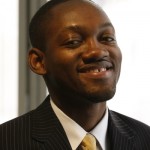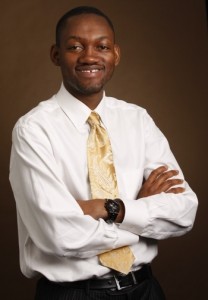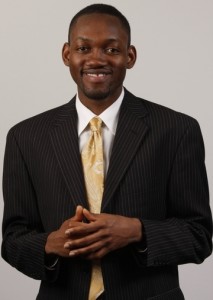
Kimmie Weeks, 27, a world renowned Liberian activist, is one of Africa’s most promising leaders. He survived a brutal civil war in Liberia, West Africa, and has been able to turn bitter memories of man’s inhumanity to man into something positive—acquiring from his experiences a strong desire to make the world a better place through inspiring messages of hope and working diligently to alleviate poverty and human suffering. In 1998, former Liberian President Charles Taylor attempted to assassinate Weeks after the latter investigated and released a groundbreaking report on the involvement of Taylor’s government in the training of children as soldiers.
Weeks is founder and Executive Director of Youth Action International (YAI), an international organization that supports victims of civil war, among other activities. He has received numerous national and international awards for his actions, including the 2007 Golden Brick Award, which honors young people under 25 years old who are making a difference in the world; and the Knight Grand Commander in the Humane Order of African Redemption, Liberia’s highest honor, which was presented to him by the country’s President Ellen Johnson Sirleaf. He also serves on the Board of Directors of DoSomething, and as a member of the World Economic Forum’s Global Agenda Council (an organization with members such as Bertie Ahern, Prime Minister of Ireland; and Andrew Crockett, President of JP Morgan Chase).
Sept. 15, 2009, Ibdabo.com caught up with Weeks via telephone as he traveled on a speaking tour in the United States. We had an enlightening chat about some of his activities and plans for the future.
IBRAHIM DABO: Kimmie, many times I follow your updates and can’t help but notice your busy travel schedule. What keeps you so engaged around the world?
KIMMIE WEEKS: Well, it is indeed very busy. There is always lot of traveling happening. Very rarely I’m I in one place more than a few days. There are different aspects to that. Usually, one part of it is traveling for my speaking tour. I do a speaking tour and every year I reach out to over 40,000 students around the world. There is also another aspect of it that relates to fundraising. For example, right now I am in the U.S. and we are doing a lot of fundraising across the country. But the final part, and the part that I think is more meaningful to me, is traveling and working in each of the countries where we currently have our offices, and this is in Sierra Leone, and in Uganda and off course, in Liberia. So a bulk of my time is spent between those country offices.
IBRAHIM DABO: You mentioned speaking tours. You also speak in U.S. Colleges and Universities, right?
KIMMIE WEEKS: That’s correct. It’s a major part of the speaking tour and where I speak to Colleges and Universities, I try to encourage them to get engaged. I try to encourage the students to become actively involved in world change.
IBRAHIM DABO: You and I endured similar childhood war experiences, having been exposed to the conflicts in Liberia and Sierra Leone, respectively. What was your experience in Liberia and how did it affect you?
KIMMIE WEEKS: I think, off course, my experience in Liberia was as a very young child, certainly being removed from a sense of normality to being in a war situation. As you know from both Liberia and Sierra Leone, it’s quite tumultuous once that happens because your entire life changes around for the worse. And that was the case for me and my Mom in Liberia, where for a long time we were battling the war and just being in that situation without access to food or clean drinking water. That was especially during the periods between 1989 and 1991 which was the toughest for us being in the war and obviously there were other recurrences throughout the civil war.
IBRAHIM DABO: I believe you must have lost some of your family members during this time, correct?
KIMMIE WEEKS: The person that was closest to me was my mother and I didn’t lose her. All of my brothers and sisters were out of Liberia living elsewhere. Several cousins were lost during the war, and several close friends who I had grown up with, they never returned. So we are not sure if they are in refugee camps but most likely many of them died during the war.
IBRAHIM DABO: The bitter experiences you describe must surely be your inspiration to make the

world a better place. I know that’s true for me. You enjoy groundbreaking, early, success. Tell us about your organization, Youth Action International (YAI), and how did it come about?
KIMMIE WEEKS: Well the Youth Action [International] is the most recent of several organizations. My first organization started in Liberia in 1994. There was an offshoot of that called the Children’s Disarmament Campaign which was in Liberia sometime in 1996 where we were advocating for the disarmament of child soldiers. In 1997, I did something called the Children’s Bureau of Information which was producing radio programmes and publication for, by, and about children… So those were the earlier projects. Youth Action International formed out of me being in the U.S. and capturing the opportunity to work on a more international level as opposed to just in Liberia, bringing to bear the resources available here in the U.S. and around the world. So it’s just being incredible being a part of this organization. I’m not alone; we have a great team that I work with both here in the U.S. and in Africa and our Board of Directors are tremendously helpful. So, it’s a joint effort which, off course, is supported by hundreds of volunteers around the world and hundreds of donors who give generously to the organization.
IBRAHIM DABO: YAI maintains branches in Sierra Leone and Uganda. What’s happening with them?
KIMMIE WEEKS: In Uganda we have been engaged in a lot of projects around HIV/AIDS, not only in terms of sensitization but also providing economic opportunities for the victims of the illness, for example, in Rakai. It’s a community that was ravaged by AIDS. Majority of the adults were killed by the disease and only the grandmothers and their children were left. So in that case what we were able to do as an organization was to go in and provide training and seeds and tools to the grandmothers to enable them to become self-sustainable. So rather than waiting for relief rations they were able to feed themselves and feed their children. That made a huge difference and a huge impact for the people there. In Sierra Leone, we’ve been in Sierra Leone really since 2005. We run a Center for Women’s Empowerment there. It was the first one we set up where every year about 150 women from some of the poorest communities in Freetown like Kroo Bay and Susan’s Bay, and Mabayla, come into the programme. They learn a skill and at the end of that training—like the ones between six to nine months—they get a micro-credit loan to start a business. We also work with Agriculture for Rural Youth in Kono and now in Kenema. So those are just a glimpse of some of the work that we are doing in both countries in addition to what we are doing in Liberia.
IBRAHIM DABO: In August, when I spoke to you on the phone, you were in Grand Bassa County, Liberia, for the opening of YAI’s Computer Training Center there. Tell us a little about the projects that are ongoing in Liberia.
KIMMIE WEEKS: Grand Bassa County is the second largest port city. It is one of the counties closest to Monrovia but Grand Bassa is really behind in terms of development and opportunities for young people, especially education. Young people who graduate from high school in Grand Bassa County have no local way of getting to a higher education institution, whether it be a Community College or a Vocational Training Center, it simply doesn’t exist. The only way you would get a higher education would be moving to Monrovia, the capital city, which is about three hours away, which means finding a new home, etc., which most young people in Grand Bassa cannot do. What we’ve come in [to do] is to provide this opportunity, first through the Computer Training Center where they will be getting that skill and will be able to use it in getting new jobs as more jobs come into Liberia. But the next process for us will be to open a Vocational Training Center in Grand Bassa and also working with our partners at Humanity Unites Brilliance (HUB) to look at how we can offer online courses to young people in Grand Bassa so they can still earn their college degrees without having to go to Monrovia or necessarily coming to the [United] States. They will be able to do it right in Buchanan.
IBRAHIM DABO: In 1998, former Liberian President Charles Taylor made several attempts to assassinate you after you investigated his government’s involvement in the training of children as soldiers, subsequently releasing a groundbreaking report. You were eventually forced into exile. What were some of your report’s major findings?
KIMMIE WEEKS: What we were working on at that point; as I said in 1996 I had headed the Children’s Disarmament Campaign and that was really a programme geared at getting the guns away from the child soldiers. Once that happened Charles Taylor became president in 1997 and it was absolutely surprising to us, shocking to us, when Charles Taylor began to train children for the national military. And I had done a report, investigated, and released a report of that training which caused the government to essentially come after me for several weeks until I fled into exile.
IBRAHIM DABO: You first returned to Liberia in 2005 after many years in exile. How did it feel to return without fear of being apprehended or even killed?
KIMMIE WEEKS: It was great. Imagine not being able to be home for such an extended period and finally having the chance to go back. It was the first time of seeing my family in many years, or classmates, or friends. But I think it was just a grand homecoming. It felt great to be back. Obviously that was the first time I was returning. It was also just a year after Charles Taylor had left power. So there had to be a lot of security around the visit, so it didn’t feel as normal as I would want but it still provided that first opportunity to be home essentially.
IBRAHIM DABO: You have won many national and international awards and in 2007, were named Knight Grand Commander in the Humane Order of African Redemption by Liberian President Ellen Johnson-Sirleaf. That same year, you received the distinguished Golden Brick Award here in the U.S. What do these recognitions mean to you?
KIMMIE WEEKS: I think they really validate the work that we are doing at Youth Action International and the journey that I started. But I think they also provide a positive image for Liberia, which is what we need. For so long the youth that came out of Liberia [were engaged in] just killing and raping, and destruction which obviously happened. But those are now in our past. What we need is to reinforce for the rest of the world and the international community that Liberia has indeed come out of war, that we are making tremendous steps and… that they are all positive things that are actually coming out of the country and I think these awards help to facilitate that. And not just only for Liberia but I think for all of the other post-war African countries. I think it highlights the young people in each of those countries that regardless of age you can make an impact both at home and abroad.
IBRAHIM DABO: Given your numerous activities, it is evident you truly value human development and peace. Many, many Liberians applaud your efforts. Do you ever think about one day becoming president of Liberia?
KIMMIE WEEKS: Well I think, especially right now, my focus is on the work that we are doing right now in Liberia, the humanitarian work in obviously the other African countries. That’s what the focus is on right now. And so nobody knows the future but what I do pray for and hope for is that there is a continuation of great leadership in Liberia because that’s what we really need more than anything. The continuation of great leadership so that they can fight corruption, put the people first, move the country forward because ultimately our goal should be getting ahead and redeeming or reclaiming the 14 years loss in the war.
IBRAHIM DABO: You’ve made significant contributions to social change over the last decade. In terms of rest and casual social activity, what does a typical day look like in the life of Kimmie Weeks?
KIMMIE WEEKS: [Laughs] On an average day, it depends on where I am in the world. If I am in Liberia, obviously a lot of the time there is around the organization’s projects in the field and obviously if I am in the U.S. I am heavily engaged in speaking tours. Like now I am working right from our Michigan office. But I do find time, I mean, it’s essential and necessary. I do find time to spend with friends and family. I love dancing so it’s not a strange sight to see me out dancing because it’s necessary to balance life and this is what I say to young people around the world, ‘you have to balance your life no matter how passionate you are about a particular thing. You have to find a way to rejuvenate yourself or rejuvenate your spirit to ensure that you don’t burn out and then you can’t be of a service to anybody, even yourself’.
IBRAHIM DABO: Last question. What is your advice to young people around the world who struggle to develop that sense of inner self belief, that they have what it takes to make a difference in the community and our world as a whole?

KIMMIE WEEKS: Everybody needs to be engaged in one way or another, particularly young Africans. I mean, we have young Africans in the Diaspora who have great education but we need to go back and we need to contribute to the rebuilding of our countries. Whether its doctors or lawyers – and there is room for everybody – whether it’s people investing in businesses in Africa and providing… and opportunities because essentially the change for Africa starts with us. If we are all going to remain in the Diaspora, in the West, our countries do not benefit from the knowledge or the vast experience or the resources we’ve gained being abroad. So everybody needs to find a passion, obviously, but with persistence and having a goal the sky is really the limit. We can do big things, we can do great things, and we can move mountains. And, I will encourage every young person to get involved. Not everybody wants to start their own organization but I definitely would encourage people to join organizations like Youth Action International, be engaged and be a part of the rebuilding process.
IBRAHIM DABO: Thank you so much, Kimmie, for your time.
KIMMIE WEEKS: Absolutely, Ibrahim, you are “DA MAN”, my brother. Thank you for the patience…
Related Links:
· Kimmie Weeks
· Youth Action International
· Exclusive Interview: Obi Mikel Eyes Champions League And Premiership
· Exclusive Interview: Salomon Kalou Anticipates A Great Season
> Click Here to return to IB’s Blog Home Page
> Click Here to return to Ibdabo.com Home Page

Great story, great interview, great job. Keep doing what u do boy. Even Kimmie knows you are “Da Man Himself”!!
Hi Ibrahim,
This is an insightful article. I trully admire the passion you and Kimmie have for the change needed in Africa. I’m saddened by what you guys went through inyour childhood, it makes me appreciate lots of things I take for granted like Peace and stability of a Country. My country had a civil strife after the 2007 elections but it was not as bad as what I’ve read in your article but still lots of lives were lost and we have internal Refugees who’ve been didplaced. Let’s pray and hope for a better Africa and for such violence never to occur again.
Great Job!!
Regards,
Jubilee.